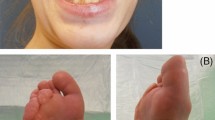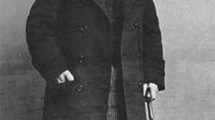Abstract
Introduction
Pycnodysostosis is typically associated with short stature, multiple fractures without adequate trauma and high bone density on x-ray. The increased bone density is due to a genetic defect of cathepsin K, leading to dysfunctional osteoclastic bone resorption and bone remodeling. We wanted to know how this defect influences the trabecular and cortical volumetric bone mineral density of long bones as measured quantitatively by pQCT.
Methods
Three siblings of a consanguineous family were admitted to our hospital because of multiple fractures. Pycnodysostosis was diagnosed based on the clinical presentation with the characteristic dense appearance of their bones on x-ray. The distal and proximal radius of the patients and of control subjects was scanned using a Stratec XCT-2000 pQCT scanner and data were processed using the software provided by the manufacturer. Genomic DNA was extracted from blood samples of all three patients and their parents. The coding exons of the cathepsin K gene (CTSK) were amplified and sequenced.
Results
The patients displayed the typical features of pycnodysostosis: Short stature, delay of closure of the fontanelles, hypoplasia of the maxilla, spondylolysis of the lumbar spine, stubby hands and feet and a history of multiple fractures. Volumetric bone density was much higher in pycnodysostotic bone than in the control bones 686 ± 28 mg/cm3 in patients vs. 290 ± 6 mg/cm3 in controls; p = 0.001), especially in the trabecular compartment (733 ± 26 mg/cm3 in patients vs. 195 ± 8 mg/cm3 in controls; p < 0.001), but also in the cortical bone (1108 ± 22 in patients vs. 1020 ± 17 in controls; p < 0.01). In contrast to this finding, the patients displayed an elevation of alkaline phosphatase in the serum and free deoxypyridinoline-crosslinks (DPD) in the urine, suggesting osteomalacia. Sequencing of the cathepsin K gene revealed homozygosity for a novel missense mutation in all three patients predicting the amino acid exchange from arginine to tryptophan at position 46 (R46W).
Conclusion
We present here for the first time quantitative data on the mineral density of bones of pycnodysostotic patients with a novel mutation in the propeptide of cathepsin K. The elevated bone mineral density in the cortex and the changes in the serum markers suggest an effect of cathepsin K not only on bone volume, but also on bone mineralization. This might in part explain the increased susceptibility to fractures of patients with pycnodysostosis.




Similar content being viewed by others
References
Soliman AT, Rajab A, AlSalmi I, Darwish A, Asfour M (1996) Defective growth hormone secretion in children with pycnodysostosis and improved linear growth after growth hormone treatment. Arch Dis Child 75:242–244
Darcan S, Akisu M, Taneli B, Kendir G (1996) A case of pycnodysostosis with growth hormone deficiency. Clin Genet 50:422–425
Ho N, Punturieri A, Wilkin D, Szabo J, Johnson M, Whaley J, Davis J, Clark A, Weiss S, Francomano C (1999) Mutations of CTSK result in pycnodysostosis via a reduction in cathepsin K protein. J Bone Miner Res 14:1649–1653
Fujita Y, Nakata K, Yasui N, Matsui Y, Kataoka E, Hiroshima K, Shiba RI, Ochi T (2000) Novel mutations of the cathepsin K gene in patients with pycnodysostosis and their characterization. J Clin Endocrinol Metab 85:425–431
Soliman AT, Ramadan MA, Sherif A, Aziz Bedair ES, Rizk MM (2001) Pycnodysostosis: clinical, radiologic, and endocrine evaluation and linear growth after growth hormone therapy. Metabolism 50:905–911
Zenke MS, Hatori M, Tago S, Hosaka M, Kokubun S (2002) Pycnodysostosis associated with spondylolysis. Arch Orthop Trauma Surg 122:248–250
Karakurt L, Yilmaz E, Belhan O, Serin E (2003) Pycnodysostosis associated with bilateral congenital pseudarthrosis of the clavicle. Arch Orthop Trauma Surg 123:125–127
Maroteaux P, Lamy M (1962) Pyknodysostosis. Presse Med 70:999–1002
Maroteaux P, Lamy M (1965) The malady of Toulouse-Lautrec. JAMA 191:715–717
Saftig P, Hunziker E, Wehmeyer O, Jones S, Boyde A, Rommerskirch W, Moritz JD, Schu P, von Figura K (1998) Impaired osteoclastic bone resorption leads to osteopetrosis in cathepsin-K-deficient mice. Proc Natl Acad Sci USA 95:13453–13458
Gelb BD, Shi GP, Chapman HA, Desnick RJ (1996) Pycnodysostosis, a lysosomal disease caused by cathepsin K deficiency. Science 273:1236–1238
Gelb BD, Spencer E, Obad S, Edelson GJ, Faure S, Weissenbach J, Desnick RJ (1996) Pycnodysostosis: refined linkage and radiation hybrid analyses reduce the critical region to 2 cM at 1q21 and map two candidate genes. Hum Genet 98:141–144
Bromme D, Okamoto K (1995) Human cathepsin O2, a novel cysteine protease highly expressed in osteoclastomas and ovary molecular cloning, sequencing and tissue distribution. Biol Chem Hoppe Seyler 376:379–384
Shi GP, Chapman HA, Bhairi SM, DeLeeuw C, Reddy VY, Weiss SJ (1995) Molecular cloning of human cathepsin O, a novel endoproteinase and homologue of rabbit OC2. FEBS Lett 357:129–134
Bossard MJ, Tomaszek TA, Thompson SK, Amegadzie BY, Hanning CR, Jones C, Kurdyla JT, McNulty DE, Drake FH, Gowen M, Levy MA (1996) Proteolytic activity of human osteoclast cathepsin K. Expression, purification, activation, and substrate identification. J Biol Chem 271:12517–12524
Kafienah W, Bromme D, Buttle DJ, Croucher LJ, Hollander AP (1998) Human cathepsin K cleaves native type I and II collagens at the N-terminal end of the triple helix. Biochem J 331:727–732
Garnero P, Borel O, Byrjalsen I, Ferreras M, Drake FH, McQueney MS, Foged NT, Delmas PD, Delaisse JM (1998) The collagenolytic activity of cathepsin K is unique among mammalian proteinases. J Biol Chem 273:32347–32352
Inaoka T, Bilbe G, Ishibashi O, Tezuka K, Kumegawa M, Kokubo T (1995) Molecular cloning of human cDNA for cathepsin K: novel cysteine proteinase predominantly expressed in bone. Biochem Biophys Res Commun 206:89–96
LaLonde JM, Zhao B, Janson CA, D’Alessio KJ, McQueney MS, Orsini MJ, Debouck CM, Smith WW (1999) The crystal structure of human procathepsin K. Biochemistry 38:862–869
McQueney MS, Amegadzie BY, D’Alessio K, Hanning CR, McLaughlin MM, McNulty D, Carr SA, Ijames C, Kurdyla J, Jones CS (1997) Autocatalytic activation of human cathepsin K. J Biol Chem 272:13955–13960
Marquis RW, Ru Y, Yamashita DS, Oh HJ, Yen J, Thompson SK, Carr TJ, Levy MA, Tomaszek TA, Ijames CF, Smith WW, Zhao B, Janson CA, Abdel-Meguid SS, D’Alessio KJ, McQueney MS, Veber DF (1999) Potent dipeptidylketone inhibitors of the cysteine protease cathepsin K. Bioorg Med Chem 7:581–588
Marquis RW, Yamashita DS, Ru Y, LoCastro SM, Oh HJ, Erhard KF, DesJarlais RL, Head MS, Smith WW, Zhao B, Janson CA, Abdel-Meguid SS, Tomaszek TA, Levy MA, Veber DF (1998) Conformationally constrained 1,3-diamino ketones: a series of potent inhibitors of the cysteine protease cathepsin K. J Med Chem 41:3563–3567
Bossard MJ, Tomaszek TA, Levy MA, Ijames CF, Huddleston MJ, Briand J, Thompson S, Halpert S, Veber DF, Carr SA, Meek TD, Tew DG (1999) Mechanism of inhibition of cathepsin K by potent, selective 1, 5-diacylcarbohydrazides: a new class of mechanism-based inhibitors of thiol proteases. Biochemistry 38:15893–15902
Inui T, Ishibashi O, Inaoka T, Origane Y, Kumegawa M, Kokubo T, Yamamura T (1997) Cathepsin K antisense oligodeoxynucleotide inhibits osteoclastic bone resorption. J Biol Chem 272:8109–8112
Stroup GB, Lark MW, Veber DF, Bhattacharyya A, Blake S, Dare LC, Erhard KF, Hoffman SJ, James IE, Marquis RW, Ru Y, Vasko-Moser JA, Smith BR, Tomaszek T, Gowen M (2001) Potent and selective inhibition of human cathepsin K leads to inhibition of bone resorption in vivo in a nonhuman primate. J Bone Miner Res 16:1739–1746
Fratzl-Zelman N, Valenta A, Roschger P, Nader A, Gelb BD, Fratzl P, Klaushofer K (2004) Decreased bone turnover and deterioration of bone structure in two cases of pycnodysostosis. J Clin Endocrinol Metab 89:1538–1547
Schoenau E, Neu CM, Rauch F, Manz F (2002) Gender-specific pubertal changes in volumetric cortical bone mineral density at the proximal radius. Bone 31:110–113
Neu CM, Manz F, Rauch F, Merkel A, Schoenau E (2001) Bone densities and bone size at the distal radius in healthy children and adolescents: a study using peripheral quantitative computed tomography. Bone 28:227–232
Gelb BD, Shi GP, Heller M, Weremowicz S, Morton C, Desnick RJ, Chapman HA (1997) Structure and chromosomal assignment of the human cathepsin K gene. Genomics 41:258–262
Santhanakrishnan BR, Panneerselvam S, Ramesh S, Panchatcharam M (1986) Pycnodysostosis with visceral manifestation and rickets. Clin Pediatr (Phila) 25:416–418
Li CY, Jepsen KJ, Majeska RJ, Zhang J, Ni R, Gelb BD, Schaffler MB (2006) Mice lacking cathepsin K maintain bone remodeling but develop bone fragility despite high bone mass. J Bone Miner Res 21:865–875
Nishi Y, Atley L, Eyre DE, Edelson JG, Superti-Furga A, Yasuda T, Desnick RJ, Gelb BD (1999) Determination of bone markers in pycnodysostosis: effects of cathepsin K deficiency on bone matrix degradation. J Bone Miner Res 14:1902–1908
Daniels ED, Pettifor JM, Moodley GP (2000) Serum osteocalcin has limited usefulness as a diagnostic marker for rickets. Eur J Pediatr 159:730–733
Ros I, Alvarez L, Guanabens N, Peris P, Monegal A, Vazquez I, Cerda D, Ballesta AM, Munoz-Gomez J (2005) Hypophosphatemic osteomalacia: a report of five cases and evaluation of bone markers. J Bone Miner Metab 23:266–269
Luftner D, Bollow M, Sturzenbecher A, Kaufmann, Priem F, Richter A, Gunther S, Geppert R, Petrides PE, Wernecke KD, Possinger K (2001) Biomarkers and imaging in non-malignant and malignant osteomalacia. Int J Biol Markers 16:136–141
Hoshino H, Kushida K, Takahashi M, Kawana K, Denda M, Yamazaki K, Inoue T (1998) Characteristics of biochemical markers in patients with metabolic bone disorders. Endocr Res 24:55–64
Kozlowski K, Yu JS (1972) Pycnodysostosis. A variant form with visceral manifestations. Arch Dis Child 47:804–807
Benz G, Schmid-Ruter E (1977) Pycnodysostosis with Heterozygous beta-thalassemia. Pediatr Radiol 5:164–171
Li F, Iqbal J, Wassif W, Kaddam I, Moniz C (1994) Carboxyterminal propeptide of type I procollagen in osteomalacia. Calcif Tissue Int 55:90–93
Robins SP, Black D, Paterson CR, Reid DM, Duncan A, Seibel MJ (1991) Evaluation of urinary hydroxypyridinium crosslink measurements as resorption markers in metabolic bone diseases. Eur J Clin Invest 21:310–315
Cabrejas ML, Fromm GA, Roca JF, Mendez MA, Bur GE, Ferreyra ME, Demarchi C, Schurman L (1976) Pycnodysostosis: some aspects concerning kinetics of calcium metabolism and bone pathology. Am J Med Sci 271:215–220
Kaplan FS, August CS, Fallon MD, Gannon F, Haddad JG (1993) Osteopetrorickets. The paradox of plenty. Pathophysiology and treatment. Clin Orthop Relat Res :64–78
Currey JD (1990) Physical characteristics affecting the tensile failure properties of compact bone. J Biomech 23:837–844
Turner CH (2002) Biomechanics of bone: determinants of skeletal fragility and bone quality. Osteoporos Int 13:97–104
Haagerup A, Hertz JM, Christensen MF, Binderup H, Kruse TA (2000) Cathepsin K gene mutations and 1q21 haplotypes in at patients with pycnodysostosis in an outbred population. Eur J Hum Genet 8:431–436
Hou WS, Bromme D, Zhao Y, Mehler E, Dushey C, Weinstein H, Miranda CS, Fraga C, Greig F, Carey J, Rimoin DL, Desnick RJ, Gelb BD (1999) Characterization of novel cathepsin K mutations in the pro and mature polypeptide regions causing pycnodysostosis. J Clin Invest 103:731–738
Johnson MR, Polymeropoulos MH, Vos HL, Ortiz de Luna RI, Francomano CA (1996) A nonsense mutation in the cathepsin K gene observed in a family with pycnodysostosis. Genome Res 6:1050–1055
Votta BJ, Levy MA, Badger A, Bradbeer J, Dodds RA, James IE, Thompson S, Bossard MJ, Carr T, Connor JR, Tomaszek TA, Szewczuk L, Drake FH, Veber DF, Gowen M (1997) Peptide aldehyde inhibitors of cathepsin K inhibit bone resorption both in vitro and in vivo. J Bone Miner Res 12:1396–1406
Acknowledgements
The authors thank the patients for their participation. MA was supported by a grant of the Deutsche Forschungsgemeinschaft (AM 103/9–1).
Author information
Authors and Affiliations
Corresponding author
Additional information
AFS and CM contributed equally and therefore share first authorship.
Funding MA was supported by a grant of the Deutsche Forschungsgemeinschaft (AM 103/9-1).
Rights and permissions
About this article
Cite this article
Schilling, A.F., Mülhausen, C., Lehmann, W. et al. High bone mineral density in pycnodysostotic patients with a novel mutation in the propeptide of cathepsin K. Osteoporos Int 18, 659–669 (2007). https://doi.org/10.1007/s00198-006-0311-y
Received:
Accepted:
Published:
Issue Date:
DOI: https://doi.org/10.1007/s00198-006-0311-y




